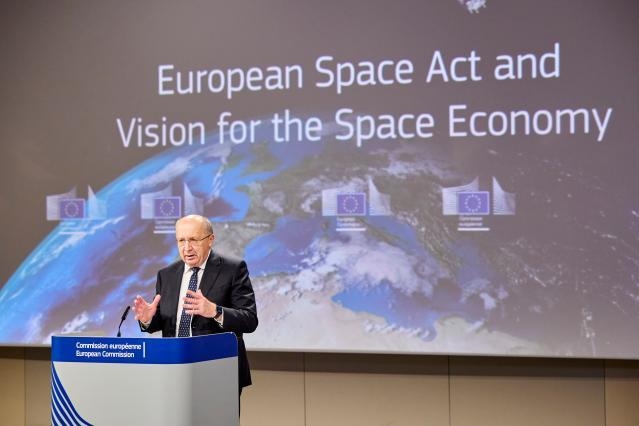The Act seeks to make Europe’s space activities safer, greener, and more competitive – both within the Union and in global markets.
The move reflects Europe’s growing urgency to address challenges in space governance, as rising satellite congestion, cyber threats, and sustainability concerns demand a coordinated response.
By streamlining rules and supporting industry growth, the EU aims to reclaim its stake in the booming global space economy.
Andrius Kubilius, Commissioner for Defence and Space, commented: “A space revolution is coming. The 21st century will be the century of space.
“Europe needs to be at the forefront. Let us embark on this extraordinary journey for our autonomy, resilience and competitiveness.”
A united launchpad for European space
Until now, Europe’s space sector has operated under a patchwork of national regulations, creating inconsistencies that hinder innovation and drive up costs.
The EU Space Act aims to harmonise this regulatory landscape, laying the groundwork for a truly internal market for space activities.
The Act directly supports objectives laid out in the Draghi and Letta reports and echoes priorities from the European Commission’s 2025 Work Programme and Competitiveness Compass.
It also builds on recent Joint Communications on space traffic management and space security, aligning EU policy with growing calls from Member States for greater cohesion.
A three-pillar strategy for orbit
The proposal is structured around three key pillars: safety, resilience, and sustainability, each aimed at ensuring Europe’s space infrastructure is future-ready.
Safety is paramount as Earth’s orbit becomes increasingly crowded. Over 11,000 satellites are currently active, with another 50,000 expected by 2035. Add to that more than 128 million pieces of space debris, and the risk of catastrophic collisions is sharply rising.
To combat this, the EU Space Act introduces mandatory tracking of space objects and enforces safe satellite deorbiting at end-of-life.
Resilience targets growing threats from cyberattacks and electronic interference that could immobilise satellites and vital ground systems.
New rules will mandate comprehensive cybersecurity assessments and incident reporting across the satellite lifecycle, reinforcing Europe’s defences against hostile disruptions.
Sustainability focuses on managing the environmental impact of space activities. Operators will be required to measure and reduce emissions while adopting greener technologies, like in-orbit servicing, to extend satellite lifespans.
Standardised reporting and verified data collection will support the sector in achieving EU-wide climate goals.
Supporting innovation, start-ups and SMEs
Recognising that one-size-fits-all regulation can stifle innovation, the EU Space Act proposes risk-based, proportional requirements.
These will be tailored to the size and maturity of each operator, ensuring that start-ups and small businesses remain competitive while maintaining safety and sustainability standards.
To ease the transition, the Commission will offer industry support through capacity building, technical guidance, and access to testing facilities, particularly for smaller operators navigating new authorisation processes.
Henna Virkkunen, Executive Vice-President for Tech Sovereignty, Security and Democracy, added: “Europe’s leadership in space must be rooted in sovereignty, security, and strategic foresight.
“With the EU Space Act, we are taking a bold step to ensure that our space infrastructure is resilient, our innovation ecosystem is empowered, and our autonomy in critical technologies is secured for generations to come.”
Charting the future of Europe’s space economy
Unveiled alongside the legislative proposal is the Commission’s Vision for the European Space Economy, a strategic plan to position the EU as a global leader in space.
It acknowledges the sector’s growing relevance across industries – from agriculture and energy to finance, defence, and climate monitoring.
To drive implementation, the EU will form a Space Team Europe, bringing together Member States, the European Space Agency (ESA), the EU Agency for the Space Programme (EUSPA), and private sector partners.
A new competitiveness monitoring methodology will also be introduced in 2025 to track progress and performance.
What’s next?
The EU Space Act will now be debated by the European Parliament and Council under the ordinary legislative procedure.
If passed, it promises to usher in a new era of coordinated, responsible space governance, setting the stage for Europe to not only protect its space assets but also unlock the full economic potential of the final frontier.
